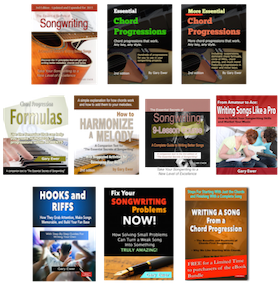How you know that you’ve written a song that really works comes down to one main thing: its ability to make listeners want to hear it over and over again.
When a song fails to do that, your job becomes one of analysis: how to figure out why a song just isn’t making the impact on an audience that you wish it would. That can be a tricky. Most people can tell you why they love a song, but may be less able to say specifically why a song isn’t doing it for them.
 Do you simply need some chords to get you started? “Essential Chord Progressions“, and “More Essential Chord Progressions” are part of “The Essential Secrets of Songwriting” eBook Bundle packages. Hundreds of chords to use as is, or modify to better suit your songs. Get today’s Deluxe Bundle Deal.
Do you simply need some chords to get you started? “Essential Chord Progressions“, and “More Essential Chord Progressions” are part of “The Essential Secrets of Songwriting” eBook Bundle packages. Hundreds of chords to use as is, or modify to better suit your songs. Get today’s Deluxe Bundle Deal.
When you consider the number of things that could go wrong with a song, it might not seem to make sense to consult a checklist. But in fact, when songs go wrong, there’s a smaller list of most common problems to consider. These are musical issues that account for probably 90% of the reasons why songs miss the mark.
Take a look at the following short list, and then think about any of your latest songs that you find are failing in some way. Which ones of these shortcomings are you responsible for?
- The form of your song is confusing. Songs in verse-chorus-bridge format have a strong, time-tested structure, one that really works. But it only works if each section behaves more or less the way they’re expected to behave. For example, chorus melodies are almost always higher than verse melodies, as a way of building song energy in a natural way. Reversing that idea — having a lower-pitched chorus — might confuse your audience.
- Your song’s melody seems aimless. If you do a line drawing representing your melody — with the line moving upward as it moves higher, and downward as the melody moves lower — you should see interesting shapes and contours in that line. If your line looks like a randomly-traced line that more resembles a scribble than a pattern, you may have uncovered why it’s not connecting to your audience.
- Your song’s chords seem aimless. A well-constructed chord progression should feature lots of repetition, and usually targets the tonic (key) chord. You’ll find that shorter progressions are easier to work into a typical pop song than longer ones, but even longer ones can work as long as you don’t stray too far away from the key of your song.
- You’re misunderstanding fragile and strong progressions. A fragile progression is one that does manage to meander a bit, offering a bit of tonal vagueness. But those kinds of progressions should be used in the verse more so than the chorus. A chorus progression usually needs to be strong – focus in on the tonic chord, and keep from getting too long.
- Separate elements within your song are fighting with each other. For example, a melody moving higher usually generates more emotional energy, due to the nature of the human voice. But hand-in-hand with that is the need for the lyric, instrumentation and overall dynamic to also be generating more musical energy. When everything partners together in this way, songs begin to click!
- You hope a good hook will solve everything for you. Hooks, when they work well, can do a lot for bringing people back to a song, and keep them humming it in the meantime. But hooks are only one part of the success of a song. So get a hook working, but then put the magnifying glass on every other aspect of your song — the progressions, lyrics, melody, instrumentation/production, and create powerful song partnerships.
The ideas above come from “Fix Your Songwriting Problems – NOW!” – one of the eBooks in “The Essential Secrets of Songwriting” 10-eBook Bundle. That eBook goes into detail with how to solve common songwriting pitfalls. You might be shocked to know how close the song you’re struggling with is to being a winner.
 Written by Gary Ewer. Follow Gary on Twitter.
Written by Gary Ewer. Follow Gary on Twitter.
 Good songwriting is a kind of problem-solving exercise. Here’s a look at some of the most common songwriting issues that most songwriters face from time to time, and more importantly, how to solve them. “Fix Your Songwriting Problems – NOW.” It’s part of the 10-eBook Bundle. Get it at the Online Store.
Good songwriting is a kind of problem-solving exercise. Here’s a look at some of the most common songwriting issues that most songwriters face from time to time, and more importantly, how to solve them. “Fix Your Songwriting Problems – NOW.” It’s part of the 10-eBook Bundle. Get it at the Online Store.











Often poor songs have all the problems mentioned above
and more like – too slow a tempo — a very poor singer ,
something most Publishers will reject a song for; this
happened in the fifties when a Demo of Bye Bye Love was rejected
because the vocals did not do the song justice, Eventually it was re done
using The Everly Brothers and the song launched their career
Tempo – Key – Right singer or singers Dated arrangement and production
plus all the above written by Gary Ewer
Pingback: Solving Songwriting’s Most Common Problems - The Hit Songwriting Formula | The Hit Songwriting Formula